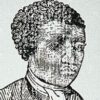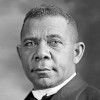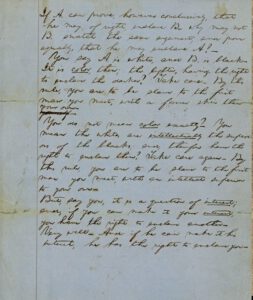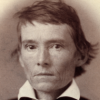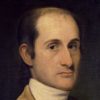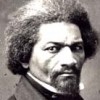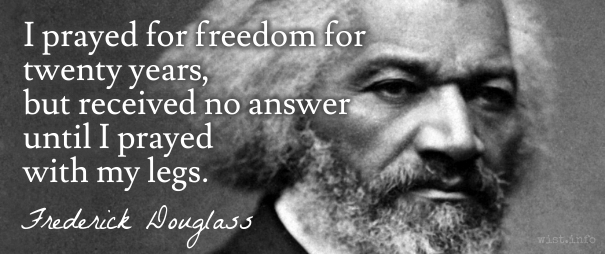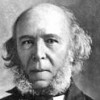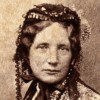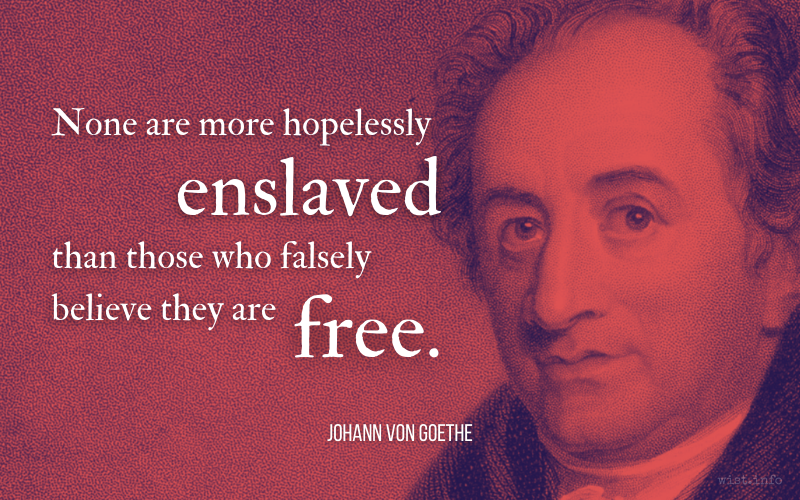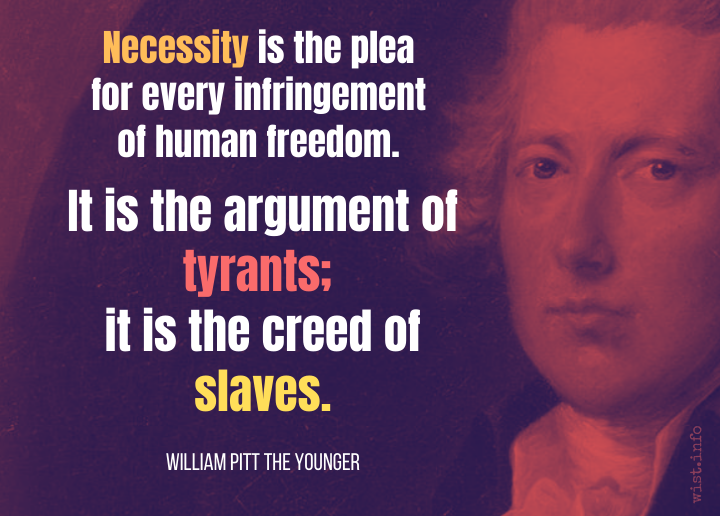In the four quarters of the globe, who reads an American book? Or goes to an American play? or looks at an American picture or statue? What does the world yet owe to American physicians or surgeons? What new substances have their chemists discovered? Or what old ones have they advanced? What new constellations have been discovered by the telescopes of Americans? Who drinks out of American glasses? Or eats from American plates? Or wears American coats or gowns? or sleeps in American blankets? Finally, under which of the old tyrannical governments of Europe is every sixth man a slave, whom his fellow-creatures may buy and sell and torture?
Sydney Smith (1771-1845) English clergyman, essayist, wit
Edinburgh Review, No. 65, Article 3 (1820-01)
(Source)
Review of Adam Seybert, Statistical Annals of the United States of America (1818).
Quotations about:
slavery
Note not all quotations have been tagged, so Search may find additional quotes on this topic.
DISOBEDIENCE, n. The silver lining to the cloud of servitude.
Ambrose Bierce (1842-1914?) American writer and journalist
“Disobedience,” The Cynic’s Word Book (1906)
(Source)
Included in The Devil's Dictionary (1911). Originally published in the "Devil's Dictionary" column in the San Francisco Wasp (1882-04-02).
To discern faults, though they be in fashion: Though Vice be clothed in cloth of gold, yet a good man will still know it. It is to no purpose for it to be apparelled in gold, it can never so well disguise it self but that it will be perceived to be of iron. It would cloak it self with the nobility of its Adherents, but it is never stript of its baseness, nor the misery of its slavery.
[Conocer los defectos, por más autorizados que estén. No desconozca la entereza el vicio, aunque se revista de brocado; corónase tal vez de oro, pero no por eso puede disimular el yerro. No pierde la esclavitud de su vileza aunque se desmienta con la nobleza del sujeto.]
Baltasar Gracián y Morales (1601-1658) Spanish Jesuit priest, writer, philosopher
The Art of Worldly Wisdom [Oráculo Manual y Arte de Prudencia], § 186 (1647) [Flesher ed. (1685)]
(Source)
(Source (Spanish)). Alternate translations:Recognise Faults, however high placed. Integrity cannot mistake vice even when clothed in brocade or perchance crowned with gold, but will not be able to hide its character for all that. Slavery does not lose its vileness, however it vaunt the nobility of its lord and master.
[tr. Jacobs (1892)]Know what is evil, however much worshiped it may be. Let the man of intelligence not fail to recognize it, even if clothed in brocade, or crowned with gold, because it cannot thereby hide its bane, -- slavery does not lose its infamy, however noble the master.
[tr. Fischer (1937)]Know when something is a defect, even if it looks like the opposite. Honesty should be able to recognize vice even when it dresses in brocade. Sometimes it wears a crown of gold, but even then it cannot hide its iron. Slavery is just as vile when disguised by high position.
[tr. Maurer (1992)]
For ourselves and for the present, we are safe; our immediate peril is past. But for how long are we safe; and how far have we removed our peril? If our nation could not itself exist half slave and half free, are we sure that it can exist in a world half slave and half free? Is the same conflict less irrepressible when world wide than it was eighty years ago when it was only nation wide? Right knows no boundaries, and justice no frontiers; the brotherhood of man is not a domestic institution.
Learned Hand (1872-1961) American jurist
“A Pledge of Allegiance,” speech, Central Park, New York City (1945-05-20)
(Source)
His second "I Am an American Day" address. Collected in The Spirit of Liberty (1953).
The United States is not a beacon, not a light of freedom! She is a warning, rather than an example to the world!
Lydia Maria Child (1802-1880) American abolitionist, activist, journalist, suffragist
Speech, Massachusetts Anti-Slavery Society 25th Anniversary Conference (1857)
(Source)
On slavery in the US, two months before the Dredd Scott decision.
Almost always elided as "The United States ... is a warning, rather than example to the world."
Slavery is not good in itself: it is neither useful to the master nor to the slave, because the slave can do nothing from virtuous motives; nor to the master, because he contracts amongst his slaves all sorts of bad habits — he becomes haughty, passionate, obdurate, vindictive, voluptuous, and cruel.
[Il n’est pas bon par sa nature; il n’est utile ni au maître ni à l’esclave: à celui-ci, parce qu’il ne peut rien faire par vertu; à celui-là, parce qu’il contracte avec ses esclaves toutes sortes de mauvaises habitudes, qu’il s’accoutume insensiblement à manquer à toutes les vertus morales, qu’il devient fier, prompt, dur, colère, voluptueux, cruel.]
Charles-Lewis de Secondat, Baron de Montesquieu (1689-1755) French political philosopher
The Spirit of Laws [De l’esprit des lois], Vol. 1, Book 15, ch. 1 (1748)
(Source (French)).
Common translation used by English and American abolitionists (e.g., 1812). Alternate translations:The state of slavery is in its own nature bad. It is neither useful to the master nor to the slave; not to the slave, because he can do nothing through a motive of virtue; not to the master, because by having an unlimited authority over his slaves, he insensibly accustoms himself to the want of all moral virtues, and from thence grows fierce, hasty, severe, choleric, voluptuous, and cruel.
[tr. Nugent (1758 ed.)]It is not good by its nature; it is useful neither to the master nor to the slave: not to the slave, because he can do nothing from virtue; not to the master, because he contracts all sorts of bad habits from his slaves, because he imperceptibly grows accustomed to failing in all the moral virtues, because he grows proud, curt, harsh, angry, voluptuous, and cruel.
[tr. Cohler/Miller/Stone (1989)]
We must not allow Negroes to be men, lest we ourselves should be suspected of not being Christians.
Charles-Lewis de Secondat, Baron de Montesquieu (1689-1755) French political philosopher
The Spirit of Laws [De l’esprit des lois], Vol. 1, Book 15, ch. 5 (1748)
In a satirical set of justifications for slavery of Africans (an institution Montesquieu generally condemned).
This form of the phrase was commonly used by American abolitionists, e.g., used as an epigram in Lydia Maria Child, An Appeal in Favor of That Class of Americans Called Africans, ch. 6 (1836).
French original text:Il est impossible que nous supposions que ces gens-là soient des hommes, parce que, si nous les supposions des hommes, on commencerait à croire que nous ne sommes pas nous-mêmes chrétiens.
Alternate translations:It is impossible for us to suppose these creatures to be men, because allowing them to be men, a suspicion would follow, that we ourselves are not Christians.
[tr. Nugent (1758 ed.)]It is impossible for us to assume that these people are men because if we assumed they were men one would begin to believe that we ourselves were not Christians.
[tr. Cohler/Miller/Stone (1989)]
Again we have deluded ourselves into believing the myth that Capitalism grew and prospered out of the Protestant ethic of hard work and sacrifice. The fact is that Capitalism was built on the exploitation and suffering of black slaves, and continues to thrive on the exploitation of the poor, both black and white, both here and abroad.
Martin Luther King, Jr. (1929-1968) American clergyman, civil rights leader, social activist, preacher
“The Three Evils,” Keynote Speech, National Conference for New Politics, Chicago (31 Aug 1967)
(Source)
We first debase the nature of man by making him a slave, and then very coolly tell him that he must always remain a slave because he does not know how to use freedom. We first crush people to the earth, and then claim the right of trampling on them forever, because they are prostrate. Truly, human selfishness never invented a rule, which worked so charmingly both ways!
Lydia Maria Child (1802-1880) American abolitionist, activist, journalist, suffragist
An Appeal on Behalf of That Class of Americans Called Africans, ch. 6 (1833)
(Source)
This Sir, was a time in which you clearly saw into the injustice of a State of Slavery, and in which you had just apprehensions of the horrors of its condition, it was now Sir, that your abhorrence thereof was so excited, that you publickly held forth this true and invaluable doctrine, which is worthy to be recorded and remember’d in all Succeeding ages. “We hold these truths to be Self evident, that all men are created equal, and that they are endowed by their creator with certain unalienable rights, that among these are life, liberty, and the pursuit of happyness.”
Here Sir, was a time in which your tender feelings for your selves had engaged you thus to declare, you were then impressed with proper ideas of the great valuation of liberty, and the free possession of those blessings to which you were entitled by nature; but Sir how pitiable is it to reflect, that altho you were so fully convinced of the benevolence of the Father of mankind, and of his equal and impartial distribution of those rights and privileges which he had conferred upon them, that you should at the Same time counteract his mercies, in detaining by fraud and violence so numerous a part of my brethren under groaning captivity and cruel oppression, that you should at the Same time be found guilty of that most criminal act, which you professedly detested in others, with respect to yourselves.
In any country, regardless of what its laws say, wherever people act upon the idea that the disadvantage of one man is the good of another, there slavery exists. Wherever, in any country the whole people feel that the happiness of all is dependent upon the happiness of the weakest, there freedom exists.
Booker T. Washington (1856-1915) American educator, writer
Speech, Republican Club, New York City (12 Feb 1909)
(Source)
Worthy work carries with it the hope of pleasure in rest, the hope of the pleasure in our using what it makes, and the hope of pleasure in our daily creative skill. All other work but this is worthless; it is slaves’ work — mere toiling to live, that we may live to toil.
William Morris (1834-1896) British textile designer, writer, socialist activist
Signs of Change, ch. 6 (1888)
(Source)
If A. can prove, however conclusively, that he may, of right, enslave B. — why may not B. snatch the same argument, and prove equally, that he may enslave A?
You say A. is white, and B. is black. It is color, then; the lighter having the right to enslave the darker? Take care. By this rule, you are to be slave to the first man you meet, with a fairer skin than your own.
You do not mean color exactly? — You mean the whites are intellectually the superior of blacks, and, therefore, have the right to enslave them? Take care again. By this rule, you are to be slave to the first man you meet, with an intellect superior to your own.
But, say you, it is a question of interest; and, if you can make it your interest, you have the right to enslave another. Very well. And if he can make it his interest, he has the right to enslave you.
Abraham Lincoln (1809-1865) American lawyer, politician, US President (1861-65)
Fragment on Slavery (c. 1854)
(Source)
It is among the evils of slavery that it taints the very sources of moral principle. It establishes false estimates of virtue and vice: for what can be more false and heartless than this doctrine which makes the first and holiest rights of humanity to depend upon the color of the skin?
John Quincy Adams (1767-1848) US President (1825-29)
Journal (3 Mar 1820)
(Source)
Discussing the debate over the Missouri Compromise.
His father wasn’t the monster he could have been with the power he held over his slaves. He wasn’t a monster at all. Just an ordinary man who sometimes did the monstrous things his society said were legal and proper.
Throughout our nervous history, we have constructed pyramidic towers of evil, ofttimes in the name of good. Our greed, fear and lasciviousness have enabled us to murder our poets, who are ourselves, to castigate our priests, who are ourselves. The lists of our subversions of the good stretch from before recorded history to this moment. We drop our eyes at the mention of the bloody, torturous Inquisition. Our shoulders sag at the thoughts of African slaves lying spoon-fashion in the filthy hatches of slave-ships, and the subsequent auction blocks upon which were built great fortunes in our country. We turn our heads in bitter shame at the remembrance of Dachau and the other gas ovens, where millions of ourselves were murdered by millions of ourselves. As soon as we are reminded of our actions, more often than not we spend incredible energy trying to forget what we’ve just been reminded of.
Maya Angelou (1928-2014) American poet, memoirist, activist [b. Marguerite Ann Johnson]
“Facing Evil,” Interview by Bill Moyers (1982)
(Source)
The new constitution has put at rest, forever, all the agitating questions relating to our peculiar institution — African slavery as it exists amongst us — the proper status of the negro in our form of civilization. This was the immediate cause of the late rupture and present revolution. […] The prevailing ideas entertained by [Jefferson] and most of the leading statesmen at the time of the formation of the old constitution, were that the enslavement of the African was in violation of the laws of nature; that it was wrong in principle, socially, morally, and politically. It was an evil they knew not well how to deal with, but the general opinion of the men of that day was that, somehow or other in the order of Providence, the institution would be evanescent and pass away. […] Our new government is founded upon exactly the opposite idea; its foundations are laid, its corner-stone rests upon the great truth, that the negro is not equal to the white man; that slavery — subordination to the superior race — is his natural and normal condition. This, our new government, is the first, in the history of the world, based upon this great physical, philosophical, and moral truth.
Alexander Stephens (1812-1883) American lawyer, politician, Confederate States Vice-President (1861-65)
“Cornerstone Speech,” Savannah (21 Mar 1861)
(Source)
On the foundation of the government of the Confederate States of America.
Every man of every color and description has a natural right to freedom.
John Jay (1745-1829) American statesman, diplomat, abolitionist, politician, Chief Justice (1789-1795)
Letter to J. C. Dongan (27 Feb 1792)
(Source)
That men should pray and fight for their own freedom, and yet keep others in slavery, is certainly acting a very inconsistent, as well as unjust and, perhaps, impious part, but the history of mankind is filled with instances of human improprieties.
John Jay (1745-1829) American statesman, diplomat, abolitionist, politician, Chief Justice (1789-1795)
Letter to Rev. Doctor Price (27 Sep 1785)
(Source)
Have we done it? Have we given freedom to the black man? What is freedom? Is it mere negation? Is it the bare privilege of not being chained, of not being bought and sold, branded and scourged? If this is all, then freedom is a bitter mockery, a cruel delusion, and it may well be questioned whether slavery were not better.
James A. Garfield (1831-1881) US President (1881), lawyer, lay preacher, educator
“Suffrage and Safety,” speech, Ravenna, Ohio (4 Jul 1865)
(Source)
In the great crisis of the war, God brought us face to face with the mighty truth, that we must lose our own freedom or grant it to the slave. In the extremity of our distress, we called upon the black man to help us save the Republic; and, amid the very thunders of battle, we made a covenant with him, sealed both with his blood and with ours, and witnessed by Jehovah, that, when the nation was redeemed, he should be free, and share with us its glories and its blessings. The Omniscient Witness will appear in judgment against us if we do not fulfill that covenant.
James A. Garfield (1831-1881) US President (1881), lawyer, lay preacher, educator
“Suffrage and Safety,” speech, Ravenna, Ohio (4 Jul 1865)
(Source)
For sure a foole I doe him firmely hold,
That loves his fetters, though they were of gold.Edmund Spenser (c. 1552-1599) English poet
The Faerie Queene. Book 3, Canto 9, st. 8 (1589-96)
(Source)
I’d rather die on my feet, than live on my knees.
[Prefiero morir de pie que vivir de rodillas.]
Emiliano Zapata 1879-1919) Mexican revolutionary, reformer [Emiliano Zapata Salazar]
(Attributed)
Often misattributed to Che Guevara, José Martí, and other revolutionaries. Popularized by "La Pasionaria" Dolores Ibárruri, during her speeches and broadcasts in the Spanish Civil War. More discussion here.
Alternate versions/translations:
- "I'd prefer to die standing, than to live always on my knees! [¡Prefiero morir de pie que vivir siempre arrodillado!]"
- "Men of the South! It is better to die on your feet than to live on your knees!"
- "I would rather die standing than live on my knees!"
- "It is better to die on your feet than to live on your knees!"
- "I prefer to die standing than to live forever kneeling."
- "Prefer death on your feet to living on your knees."
Slavery is doomed, and that within a few years. Even Judge Douglas admits it to be an evil, and an evil can’t stand discussion. In discussing it we have taught a great many thousands of people to hate it who had never given it a thought before. What kills the skunk is the publicity it gives itself.
Abraham Lincoln (1809-1865) American lawyer, politician, US President (1861-65)
Interview with David R. Locke (1859)
(Source)
Recounted in A. T. Rice, Reminiscences of Abraham Lincoln, ch. 25 (1896).
I am a democrat because I believe in the Fall of Man. I think most people are democrats for the opposite reason. A great deal of democratic enthusiasm descends from the ideas of people like Rousseau, who believed in democracy because they thought mankind so wise and good that everyone deserved a share in government. The danger of defending democracy on those grounds is that they’re not true. And whenever their weakness is exposed, the people who prefer tyranny make capital out of the exposure. I find that they’re not true without looking further than myself. I don’t deserve a share in governing a hen-roost, much less a nation. Nor do most people — all the people who believe advertisements, and think in catchwords and spread rumours. The real reason for democracy is just the reverse. Mankind is so fallen that no man can be trusted with unchecked power over his fellows. Aristotle said that some people were only fit to be slaves. I do not contradict him. But I reject slavery because I see no men fit to be masters.
“If you give a nigger an inch, he will take an ell. A nigger should know nothing but to obey his master — to do as he is told to do. Learning will spoil the best nigger in the world. Now, if you teach that nigger how to read, there would be no keeping him. It would forever unfit him to be a slave. He would at once become unmanageable, and of no value to his master. As to himself, it could do him no good, but a great deal of harm. It would make him discontented and unhappy.”
Frederick Douglass (1817-1895) American abolitionist, orator, writer
Narrative of the Life of Frederick Douglass, ch. 6 [Mr. Auld] (1845)
(Source)
Quoting his master, Auld, chastising Mrs. Auld for teaching Douglass to read. Frequently paraphrased down to "Knowledge makes a man unfit to be a slave."
SPARTACUS: When a free man dies, he loses the pleasure of life. A slave loses his pain. Death is the only freedom a slave knows. That’s why he’s not afraid of it. That’s why we’ll win.
Many of the ugly pages of American history have been obscured and forgotten. A society is always eager to cover misdeeds with a cloak of forgetfulness, but no society can fully repress an ugly past when the ravages persist into the present. America owes a debt of justice which it has only begun to pay. If it loses the will to finish or slackens in its determination, history will recall its crimes and the country that would be great will lack the most indispensable element of greatness — justice.
Martin Luther King, Jr. (1929-1968) American clergyman, civil rights leader, social activist, preacher
Where Do We Go from Here: Chaos or Community? (1967)
(Source)
MARRIAGE, n. The state or condition of a community consisting of a master, a mistress, and two slaves, making in all, two.
Stone walls do not a prison make,
Nor iron bars a cage.
I believe it is better to tell the truth than to lie. I believe that it is better to be free than to be a slave. And I believe that it is better to know than to be ignorant.
H. L. Mencken (1880-1956) American writer and journalist [Henry Lewis Mencken]
“What I Believe,” sec. 6, Forum and Century (Sep 1930)
(Source)
Look at the tyranny of party — at what is called party allegiance, party loyalty — a snare invented by designing men for selfish purposes — and which turns voters into chattels, slaves, rabbits, and all the while their masters, and they themselves are shouting rubbish about liberty, independence, freedom of opinion, freedom of speech, honestly unconscious of the fantastic contradiction; and forgetting or ignoring that their fathers and the churches shouted the same blasphemies a generation earlier when they were closing their doors against the hunted slave, beating his handful of humane defenders with Bible texts and billies, and pocketing the insults and licking the shoes of his Southern Master.
This declared indifference, but as I must think, covert real zeal for the spread of slavery, I cannot but hate. I hate it because of the monstrous injustice of slavery itself. I hate it because it deprives our Republican example of its just influence in the world — enables the enemies of free institutions, with plausibility, to taunt us as hypocrites — causes the real friends of freedom to doubt our sincerity, and especially because it forces so many really good men amongst ourselves into an open war with the very fundamental principles of civil liberty — criticizing the Declaration of Independence, and insisting that there is no right principle of action but self-interest.
Who but shall learn that freedom is the prize
Man still is bound to rescue or maintain;
That nature’s God commands the slave to rise,
And on the oppressor’s head to break the chain.
Roll, years of promise, rapidly roll round,
Till not a slave shall on this earth be found.John Quincy Adams (1767-1848) US President (1825-29)
Diary (1826-10-30)
(Source)
Sonnet written on the birthday of his father, John Adams, six months after his death.
The conflict between the principle of liberty and the fact of slavery is coming gradually to an issue. Slavery has now the power, and falls into convulsions at the approach of freedom. That the fall of slavery is predetermined in the counsels of Omnipotence I cannot doubt; it is a part of the great moral improvement in the condition of man, attested by all the records of history. But the conflict will be terrible, and the progress of improvement perhaps retrograde before its final progress to consummation.
We know the redemption must come. The time and the manner of its coming we know not: It may come in peace, or it may come in blood; but whether in peace or in blood, LET IT COME.
John Quincy Adams (1767-1848) US President (1825-29)
Speech to “The colored people of Pittsburge, Pennsylvania” (1843)
Representative Dellet of Alabama quoted the speech before the House of Representatives, then asked Adams, "though it cost the blood of thousands of white men?" Adams responded, "Though it cost the blood of millions of white men, let it come. Let justice be done, though the heavens fall."
It is among the evils of slavery that it taints the very sources of moral principle. It establishes false estimates of virtue and vice: for what can be more false and heartless than this doctrine which makes the first and holiest rights of humanity to depend upon the color of the skin?
I prayed for freedom for twenty years, but received no answer until I prayed with my legs.
I expose slavery in this country, because to expose it is to kill it. Slavery is one of the monsters of darkness to whom the light of truth is death.
Frederick Douglass (1817-1895) American abolitionist, orator, writer
Speech, Moorfields, England (22 May 1846)
(Source)
Slavery was contrary to all the moral principles advocated by Plato and Aristotle, yet neither of them saw this because to renounce slavery would have meant the collapse of the life they were living.
If the human animal has any value at all, he is too valuable to be property. If he has an inner dignity, he is much too proud to own other men. I don’t give a damn how scrubbed and perfumed he may be, a slave owner is subhuman.
Nearly eighty years ago we began by declaring that all men are created equal; but now from that beginning we have run down to the other declaration, that for some men to enslave others is a “sacred right of self-government.” These principles cannot stand together. They are as opposite as God and Mammon; and whoever holds to the one must despise the other.
He has waged cruel war against human nature itself, violating it’s most sacred rights of life & liberty in the persons of a distant people who never offended him, captivating & carrying them into slavery in another hemisphere, or to incur miserable death in their transportation thither. this piratical warfare, the opprobrium of infidel powers, is the warfare of the christian king of Great Britain. determined to keep open a market where MEN should be bought & sold, he has prostituted his negative for suppressing every legislative attempt to prohibit or to restrain this execrable commerce and that this assemblage of horrors might want no fact of distinguished die, he is now exciting those very people to rise in arms among us, and to purchase that liberty of which he has deprived them, by murdering the people upon whom he also obtruded them; thus paying off former crimes committed against the liberties of one people, with crimes which he urges them to commit against the lives of another.
Thomas Jefferson (1743-1826) American political philosopher, polymath, statesman, US President (1801-09)
“Declaration of Independence,” original draft (1776-06)
(Source)
This anti-slavery clause was included in the submission to the Continental Congress. It was removed from the Declaration at the behest of the delegation from South Carolina, as a requirement for their vote.
I am aware that many object to the severity of my language, but is there not cause for severity? I will be as harsh as truth, and as uncompromising as justice. On this subject, I do not wish to think, or speak, or write in moderation. No! No! Tell a man whose house is on fire, to give a moderate alarm; tell him to moderately rescue his wife from the hands of the ravisher; tell the mother to gradually extricate her babe from the fire into which it has fallen — but urge me not to use moderation in a cause like the present. I am in earnest — I will not equivocate — I will not excuse — I will not retreat a single inch; and I will be heard.
We hear often of the distress of the negro servants, on the loss of a kind master; and with good reason, for no creature on God’s earth is left more utterly unprotected and desolate than the slave in these circumstances. The child who has lost a father has still the protection of friends, and of the law; he is something, and can do something, — has acknowledged rights and position; the slave has none. The law regards him, in every respect, as devoid of rights as a bale of merchandise. The only possible acknowledgment of any of the longings and wants of a human and immortal creature, which are given to him, comes to him through the sovereign and irresponsible will of his master; and when that master is stricken down, nothing remains.
“It don’t look well, now, for a feller to be praisin’ himself; but I say it jest because it’s the truth. I believe I’m reckoned to bring in about the finest droves of niggers that is brought in, — at least, I’ve been told so; if I have once, I reckon I have a hundred times, — all in good case, — fat and likely, and I lose as few as any man in the business. And I lays it all to my management, sir; and humanity, sir, I may say, is the great pillar of my management.”
George’s first voyage was on a slaver, and he wished himself dead many a time before it was over, — and ever after would talk like a man beside himself, if the subject was named. He declared that the gold made in it was distilled from human blood, from mothers’ tears, from the agonies and dying groans of gasping, suffocating men and women, and that it would sear and blister the soul of him that touched it; in short, he talked as whole-souled, unpractical fellows are apt to talk about what respectable people sometimes do. Nobody had ever instructed him that a slaveship, with a procession of expectant sharks in its wake, is a missionary institution, by which closely. packed heathens are brought over to enjoy the light of the Gospel.
I wrote what I did because as a woman, as a mother I was oppressed and broken-hearted, with the sorrows and injustice I saw, because as a Christian I felt the dishonor to Christianity — because as a lover of my country I trembled at the coming day of wrath. It is no merit in the sorrowful that they weep, or to the oppressed and smothering that they gasp and struggle, not to me, that I must speak for the oppressed — who cannot speak for themselves.
Whipping and abuse are like laudanum; you have to double the dose as the sensibilities decline.
What a stupendous, what an incomprehensible machine is man! who can endure toil, famine, stripes, imprisonment & death itself in vindication of his own liberty, and the next moment be deaf to all those motives whose power supported him thro’ his trial, and inflict on his fellow men a bondage, one hour of which is fraught with more misery than ages of that which he rose in rebellion to oppose.
Thomas Jefferson (1743-1826) American political philosopher, polymath, statesman, US President (1801-09)
Letter to Jean Nicholas Démeunier (22 Jun 1786)
(Source)
This was part of a response to a draft article on the United States ("Essai sur les États-Unis") being put together for the Encyclopédie Méthodique which Démeunier had passed by Jefferson for comment. Jefferson requested changes on a number of items, including a passage on a new Virginia slave law and the failure of some of the delegates to propose an amendment for the gradual emancipation of slaves (Jefferson had not attended the legislative session, being in France). This quotation appeared toward the end of that proposed revision.
In the end, Démeunier provided this French translation in his article:L’homme est un être bien étonnant et bien incompréhensible! pour défendre sa liberté, il souffre la fatigue, la faim, les coups de fouet, la prison et la mort, et le moment d’après les nobles sentimens qui l’ont soutenu dans de cruelles épreuves, ne font plus d’impression sur lui, et il impose à d’autres hommes une servitude qui, dans la durée d’une heure, produit plus de peines et de douleur, que l’assujettissement contre lequel il a pris les armes, n’en eût produit dans des siecles.
What is blasphemy? I will give you a definition; I will give you my thought upon this subject. What is real blasphemy?
To live on the unpaid labor of other men — that is blasphemy.
To enslave your fellow-man, to put chains upon his body — that is blasphemy.
To enslave the minds of men, to put manacles upon the brain, padlocks upon the lips — that is blasphemy.
To deny what you believe to be true, to admit to be true what you believe to be a lie — that is blasphemy.
To strike the weak and unprotected, in order that you may gain the applause of the ignorant and superstitious mob — that is blasphemy.
To persecute the intelligent few, at the command of the ignorant many — that is blasphemy.
To forge chains, to build dungeons, for your honest fellow-men — that is blasphemy.
To pollute the souls of children with the dogma of eternal pain — that is blasphemy.
To violate your conscience — that is blasphemy.
The jury that gives an unjust verdict, and the judge who pronounces an unjust sentence, are blasphemers.
The man who bows to public opinion against his better judgment and against his honest conviction, is a blasphemer.Robert Green Ingersoll (1833-1899) American lawyer, agnostic, orator
Trial of C.B. Reynolds for blasphemy (May 1887)
(Source)
The enemy held my will in his power and from it he had made a chain and shackled me. My will was perverse and lust had grown from it, and when I gave in to lust habit was born, and when I did not resist the habit it became a necessity. These were the links which together formed what I have called my chain, and it held me fast in the duress of servitude.
[Velle meum tenebat inimicus et inde mihi catenam fecerat et constrinxerat me. Quippe ex voluntate perversa facta est libido, et dum servitur libidini, facta est consuetudo, et dum consuetudini non resistitur, facta est necessitas. Quibus quasi ansulis sibimet innexis (unde catenam appellavi) tenebat me obstrictum dura servitus.]
Augustine of Hippo (354-430) Christian church father, philosopher, saint [b. Aurelius Augustinus]
Confessions, Book 8, ch. 5 / ¶ 10 (8.5.10) (c. AD 398) [tr. Pine-Coffin (1961)]
(Source)
Sometimes paraphrased "Habit, if not resisted, soon becomes necessity."
(Source (Latin)). Alternate translations:My will the enemy held, and thence had made a chain for me, and bound me. For of a forward will, was a lust made; and a lust served, became custom; and custom not resisted, became necessity. By which links, as it were, joined together (whence I called it a chain) a hard bondage held me enthralled.
[tr. Pusey (1838), and ed. Shedd (1860)]My will was the enemy master of, and thence had made a chain for me and bound me. Because of a perverse will was lust made; and lust indulged in became custom; and custom not resisted became necessity. By which links, as it were, joined together (whence I term it a “chain”), did a hard bondage hold me enthralled.
[tr. Pilkington (1876)]The enemy held my will , and with me made a chain for me and bound me. For from a perverse will, lust was made; and in obeying lust, habit was formed, and habit not resisted, became necessity. By which links, as it were, joined together -- therefore I call it a chain -- was I held shackled with a hard bondage.
[tr. Hutchings (1890)]The enemy held fast my will, and had made of it a chain, and bound me tight therewith. For from a perverse will came lust, and the service of lust ended in habit, and acquiescence in habit produced necessity. These were the links of what I call my chain, and they held me bound in hard slavery.
[tr. Bigg (1897)]The enemy held my will; and of it he made a chain and bound me. Because my will was perverse it changed to lust, and lust yielded to became habit, and habit not resisted became necessity. These were like links hanging one on another -- which is why I have called it a chain -- and their hard bondage held me bound hand and foot.
[tr. Sheed (1943)]The enemy held fast my will, and had made of it a chain, and had bound me tight with it. For out of the perverse will came lust, and the service of lust ended in habit, and habit, not resisted, became necessity. By these links, as it were, forged together--which is why I called it “a chain”--a hard bondage held me in slavery.
[tr. Outler (1955)]The enemy had control of my will, and out of it he fashioned a chain and fettered me with it. For in truth lust is made out of a perverse will, and when lust is served, it becomes habit, and when habit is not resisted, it becomes necessity. By such links, joined one to another, as it were -- for this reason I have called it a chain -- a harsh bondage held me fast.
[tr. Ryan (1960)]The enemy held my will and made a chain out of it and bound me with it. From a perverse will came lust, and slavery to lust became a habit, and the habit, being constantly yielded to, became a necessity. These were like links, hanging each to each (which is why I called it a chain), and they held me fast in a hard slavery.
[tr. Warner (1963)]My willingness the enemy held, and out of it had made me a chain and bound me. Of stubborn will ios a lust made. When a lust is served, a custom is made, and when a custom is not resisted a necessity is made. It was as though link was bound to link (hence what I called a chain) and hard bondage held me bound.
[tr. Blailock (1983)]
Facts too shocking to be contemplated occasionally force their way to the public ear, and the comment that one often hears made on them is more shocking than the thing itself. It is said, “Very likely such cases may now and then occur, but they are no sample of general practice.” If the laws of New England were so arranged that a master could now and then torture an apprentice to death, would it be received with equal composure? Would it be said, “These cases are rare, and no samples of general practice”? This injustice is an inherent one in the slave system, — it cannot exist without it.
Is man ever a creature to be trusted with wholly irresponsible power? And does not the slave system, by denying the slave all legal right of testimony, make every individual owner an irresponsible despot? Can anybody fall to make the inference what the practical result will be? If there is, as we admit, a public sentiment among you, men of honor, justice and humanity, is there not also another kind of public sentiment among the ruffian, the brutal and debased? And cannot the ruffian, the brutal, the debased, by slave law, own just as many slaves as the best and purest? Are the honorable, the just, the high-minded and compassionate, the majority anywhere in this world?
If a man has a genuine, sincere, hearty wish to get rid of his liberty, if he is really bent upon becoming a slave, nothing can stop him. And the temptation is to some natures a very great one. Liberty is often a heavy burden on a man. It involves that necessity for perpetual choice which is the kind of labor men have always dreaded. In common life we shirk it by forming habits, which take the place of self-determination. In politics party-organization saves us the pains of much thinking before deciding how to cast our vote. In religious matters there are great multitudes watching us perpetually, each propagandist ready with his bundle of finalities, which having accepted we may be at peace. The more absolute the submission demanded, the stronger the temptation becomes to those who have been long tossed among doubts and conflicts.
Oliver Wendell Holmes, Sr. (1809-1894) American poet, essayist, scholar
Elsie Venner, ch. 18 (1859)
(Source)
Do Business, but be not a Slave to it.
Thomas Fuller (1654-1734) English physician, preacher, aphorist, writer
Gnomologia: Adages and Proverbs, #1304 (1732)
(Source)
If a man really believes that God once upheld slavery; that he commanded soldiers to kill women and babes; that he believed in polygamy; that he persecuted for opinion’s sake; that he will punish forever, and that he hates an unbeliever, the effect in my judgment will be bad. It always has been bad. This belief built the dungeons of the Inquisition. This belief made the Puritan murder the Quaker.
Robert Green Ingersoll (1833-1899) American lawyer, agnostic, orator
Interview, The Sunday Union, New Haven, Conn. (10 Apr 1881)
(Source)
A slave has but one master; an ambitious man has as many masters as there are people who may be useful in bettering his position.
[L’esclave n’a qu’un maître; l’ambitieux en a autant qu’il y a de gens utiles à sa fortune.]
Jean de La Bruyère (1645-1696) French essayist, moralist
The Characters [Les Caractères], ch. 8 “Of the Court [De la Cour],” § 70 (8.70) (1688) [tr. Van Laun (1885)]
(Source)
(Source (French)). Alternate translations:A Slave has but one Master, an ambitious Man a great many, all those who are useful to him in making his fortune.
[Bullord ed. (1696)]A Slave has but one Master; an ambitious Man has as many as there are People useful to him in making his Fortune.
[Curll ed. (1713)]A purchased Slave has but one Master: An ambitious Man must be a Slave to all who may conduce to his Aggrandizement.
[Browne ed. (1752)]A slave has only one master; an ambitious man is enslaved to all those who may help to further his advancement.
[tr. Stewart (1970)]
Therefore the good man, although he is a slave, is free; but the bad man, even if he reigns, is a slave, and that not of one man, but, what is far more grievous, of as many masters as he has vices.
[Proinde bonus etiamsi seruiat, liber est; malus autem etiamsi regnet, seruus est, nec unius hominis, sed, quod est grauius, tot dominorum, quot uitiorum.]
Augustine of Hippo (354-430) Christian church father, philosopher, saint [b. Aurelius Augustinus]
City of God [De Civitate Dei], Book 4, ch. 3 (4.3) (AD 412-416) [ed. Dods (1871)]
(Source)
See 2 Peter 2:19 "For people are slaves to whatever masters them." The idea of being a slave to vices was also a Stoic belief. Compare to La Bruyere.
(Source (Latin)). Alternate translations:And therefore he that is good is free though he be a slave, and he that is evil, a slave though he be a king. Nor is he slave to one man, but that which is worst of all, unto as many masters as he affects vices.
[tr. Healey (1610)]Thus, a good man, though a slave, is free; but a wicked man, though a king, is a slave. For he serves, not one man alone, but, what is worse, as many masters as he as vices.
[tr. Zema/Walsh (1950)]Hence even if a good man be a slave, he is free; whereas if a wicked man rule, he is a slave -- and a slave not to one man but, what is worse, to as many masters as he has vices.
[tr. Green (Loeb) (1963)]The good man, though a slave, is free; the wicked, though he reigns, is a slave, and not the slave of a single man, but -- what is far worse -- the slave of as many masters as he has vices.
[tr. Bettenson (1972)]Therefore the good man is free even if he is a slave, whereas the bad man is a slave even if he reigns: a slave, not to one man, but, what is worse, to as many masters as he has vices.
[tr. Dyson (1998)]Thus the good person is free, even if a slave, and the evil person is enslaved, even if a ruler -- enslaved not to one master but, what is far worse, to as many masters as he has vices.
[tr. Babcock (2012)]
This is a world of compensation; and he who would be no slave must consent to have no slave. Those who deny freedom to others deserve it not for themselves, and, under a just God, cannot long retain it.
None are more hopelessly enslaved than those who falsely believe they are free.
[Niemand ist mehr Sklave als der sich für frei hält ohne es zu sein.]
Johann Wolfgang von Goethe (1749-1832) German poet, statesman, scientist
Elective Affinities [Die Wahlverwandtschaften], Part 2, ch. 5, “From Ottilie’s Journal [Aus Ottiliens Tagebuche]” (1809) [tr. Wenckstern (1853)]
(Source)
(Source (German)). Alternate translation:No one is more a slave than the man who thinks himself free while he is not.
[Niles ed. (1872)]No one is more a slave than he who thinks he is free without being so.
[tr. Hollingdale (1971)]
Few men desire liberty; most men wish only for a just master.
[Namque pauci libertatem, pars magna iustos dominos volunt.]
Serving one’s own Passions is the greatest Slavery.
Thomas Fuller (1654-1734) English physician, preacher, aphorist, writer
Gnomologia: Adages and Proverbs, #4103 (1732)
(Source)
It is true, the bill is said to be founded on necessity; but what is this? Is it not necessity, which has always been the plea of every illegal exertion of power, or exercise of oppression? Is not necessity the pretence of every usurpation? Necessity is the plea for every infringement of human freedom. It is the argument of tyrants; it is the creed of slaves.
Many politicians are in the habit of laying down as self-evident the proposition that no people ought to be free till they are fit to use their freedom. This maxim is worthy of the fool in the old story who resolved not to go into the water till he had learned to swim! If men are to wait for liberty till they become wise and good in slavery, they may indeed wait forever.
Thomas Babington Macaulay (1800-1859) English writer and politician
“John Milton,” Edinburgh Review (Aug 1825)
(Source)
Peace indeed is both sweet in name and wholesome in reality; but there is all the difference in the world between peace and slavery. Peace is the calmness of freedom, slavery the worst of all evils, to be kept off at a the cost not only of war, but even of life itself.
[Et nomen pacis dulce est et ipsa res salutaris; sed inter pacem et servitutem plurimum interest. Pax est tranquilla libertas, servitus postremum malorum omnium, non modo bello sed morte etiam repellendum.]
Marcus Tullius Cicero (106-43 BC) Roman orator, statesman, philosopher
Philippicae [Philippics], No. 2, ch. 44 / sec. 113 (2.113) (24 October AD 44) [tr. King (1867)]
(Source)
(Source (Latin)). Alternate translations:The name of peace is sweet, the thing itself is most salutary. But between peace and slavery there is a wide difference. Peace is liberty in tranquillity; slavery is the worst of all evils, -- to be repelled, if need be, not only by war, but even by death. [tr. Yonge (1903)]And the name of peace is sweet, and the thing itself wholesome, but between peace and servitude the difference is great. Peace is tranquil liberty, servitude the last of all evils, one to be repelled, not only by war but even by death.
[tr. Ker (1926)]The name of peace is sweet, and the thing itself is beneficial, but there is a great difference between peace and servitude. Peace is freedom in tranquility, servitude is the worst of all evils, to be resisted not only by war, but even by death.








